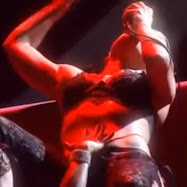I shall become complicated again presently, and you will hear from me
directly that happens.
The house only emptied itself this morning; I may say emptied, for the
remainder fits like a saint into her niche, and is far too comfortable
to count. This is C , whom you only once met, when she sat so much in
the background that you will not remember her. She has one weakness, a
thirst between meals the blameless thirst of a rabid teetotaler. She
hides cups of cold tea about the place, as a dog its bones: now and then
one gets spilled or sat on, and when she hears of the accident, she
looks thirsty, with a thirst which only that particular cup of tea
could have quenched. In no other way is she any trouble: indeed, she is
a great dear, and has the face of a Madonna, as beautiful as an
apocryphal gospel to look at and "make believe" in.
Arthur, too, like the rest of them, when he came over to give me his
brotherly blessing, wished to know what you were like. I didn't pretend
to remember your outward appearance too well, told him you looked like
a common or garden Englishman, and roused his suspicions by so careless
a championship of my choice. He accused me of being in reality highly
sentimental about you, and with having at that moment your portrait
concealed and strung around my neck in a locket. Mother-Aunt stood up
for me against him, declaring I was "too sensible a girl for nonsense of
that sort." (It is a little weakness of hers, you know, to resent
extremes of endearment towards anyone but herself in those she has
"brooded," and she has thought us hitherto most restrained and
proper as, indeed, have we not been?) Arthur and I exchanged tokens of
truce: in a little while off went my aunt to bed, leaving us alone.
Then, for he is the one of us that I am most frank with: "Arthur," cried
I, and up came your little locket like a bucket from a well, for him to
have his first sight of you, my Beloved. He objected that he could not
see faces in a nutshell; and I suppose others cannot: only I.
He, too, is gone. If you had been coming he would have spared another
day for to-day was planned and dated, you will remember and we would
have ridden halfway to meet you. But, as fate has tripped you, and made
all comings on your part indefinite, he sends you his hopes for a later
meeting.
How is your poor foot? I suppose, as it is ill, I may send it a kiss by
post and wish it well? I do. Truly, you are to let me know if it gives
you much pain, and I will lie awake thinking of you. This is not
sentimental, for if one knows that a friend is occupied over one's
sleeplessness one feels the comfort.
I am perplexed how else to give you my company: your mother, I know,
could not yet truly welcome me; and I wish to be as patient as possible,
and not push for favors that are not offered. So I cannot come and ask
to take you out in her carriage, nor come and carry you away in mine.
We must try how fast we can hold hands at a distance.
I have kept up to where you have been reading in "Richard Feverel,"
though it has been a scramble: for I have less opportunity of reading, I
with my feet, than you without yours. In your book I have just got to
the smuggling away of General Monk in the perforated coffin, and my
sense of history capitulates in an abandonment of laughter. I yield! The
Gaul's invasion of Britain always becomes broad farce when he attempts
it. This in clever ludicrousness beats the unintentional comedy of
Victor Hugo's "John-Jim-Jack" as a name typical of Anglo-Saxon
christenings. But Dumas, through a dozen absurdities, knows apparently
how to stalk his quarry: so large a genius may play the fool and remain
wise.
You see I have given your author a warm welcome at last: and what about
you and mine? Tell me you love his women and I will not be jealous.
Indeed, outside him I don't know where to find a written English woman
of modern times whom I would care to meet, or could feel honestly bound
to look up to: nowhere will I have her shaking her ringlets at me in
Dickens or Thackeray. Scott is simply not modern; and Hardy's women, if
they have nobility in them, get so cruelly broken on the wheel that you
get but the wrecks of them at last. It is only his charming baggages who
come to a good ending.
I like an author who has the courage and self-restraint to leave his noble
creations alive: too many try to ennoble them by death. For my part, if I
have to go out of life before you, I would gladly trust you to the hands
of Clara, or Rose, or Janet, or most of all Vittoria; though, to be
accurate, I fear they have all grown too old for you by now.
And you? have you any men to offer me in turn out of your literary
admirations, supposing you should die of a snapped ankle? Would you give
me to d'Artagnan for instance? Hardly, I suspect! But either choose me
some proxy hero, or get well and come to me! You will be very welcome
when you do. Sleep is making sandy eyes at me: good-night, dearest.
Continued below...





















